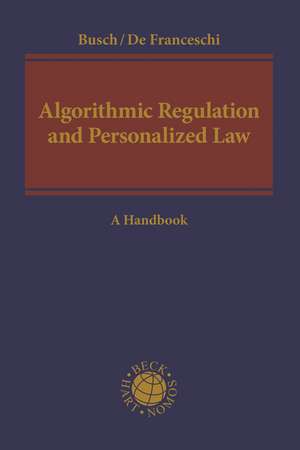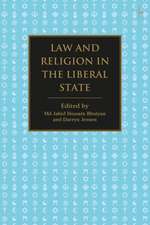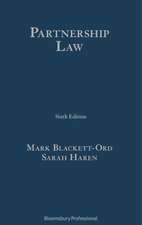Algorithmic Regulation and Personalized Law: A Handbook
Editat de Christoph Busch, Alberto De Franceschien Limba Engleză Hardback – 23 dec 2020
Preț: 1012.16 lei
Preț vechi: 1387.27 lei
-27% Nou
Puncte Express: 1518
Preț estimativ în valută:
193.67€ • 202.94$ • 160.11£
193.67€ • 202.94$ • 160.11£
Carte disponibilă
Livrare economică 22 martie-05 aprilie
Preluare comenzi: 021 569.72.76
Specificații
ISBN-13: 9781509931750
ISBN-10: 1509931759
Pagini: 300
Dimensiuni: 156 x 234 x 27 mm
Greutate: 0.77 kg
Editura: Bloomsbury Publishing
Colecția Beck/Hart
Locul publicării:London, United Kingdom
ISBN-10: 1509931759
Pagini: 300
Dimensiuni: 156 x 234 x 27 mm
Greutate: 0.77 kg
Editura: Bloomsbury Publishing
Colecția Beck/Hart
Locul publicării:London, United Kingdom
Notă biografică
Christoph Busch is Professor of European Private and Business Law at the University of Osnabrück and Co-Chair of the European Law Institute's Digital Law Group.Alberto De Franceschi is Professor of Private Law at the University of Ferrara and Co-Chair of the European Law Institute's Digital Law Group.
Cuprins
Summary of ContentsPart 1The Concept of Personalized LawA. Personalizing Default Rules and Disclosure with Big Data (Porat/Strahilevitz) I. IntroductionII. Theories of personalized default rules III. The feasibility of personalized default rulesIV. Possible Objections and LimitationsV. Personalized disclosure VI. Conclusion B. Personalizing Negligence Law (Ben-Shahar/Porat)I. IntroductionII. Personalized negligence under existing law III. The efficiency of personalized standards IV. Justice considerations V. Broadening personalizationVI. Conclusion C. The Death of Rules and Standards (Casey/Niblett) I. IntroductionII. The emergence of microdirectives and the decline of rules and standardsIII. Conclusion Part 2Critique and Theoretical PerspectivesD. The Law between Generality and Particularity. Chances and Limits of Personalized Law (Grigoleit/Bender) I. IntroductionII. Distinctions and notional specifications III. Evolutionary perspectives IV. Revolutionary perspectives V. ConclusionsE. Granular Norms and the Concept of Law: A Critique (Auer)I. The Inevitability of Legal Typification II. The Problem of Algorithmic Discrimination III. The Scope of Granular Law and the Rise of ConsumerismIV. Regulation and the Rule of LawV. Granularization and the Problem of Rule-FollowingF. Logopoeia: Normative Typification and Granular Norm's Informational Differentiation (Femia) I. More acts or more words: negotia, pragmata, activitiesII. Two ways of grasping reality: taming the chaos with Emilio Betti and Tullio AscarelliIII. End of the journey among the concepts' penumbra. From type to typification, and from typification to disseminationIV. Big data: quantities make a qualitative shift in nomogenesis V. Nomogenesis at the intersection point between normative technique and informational limit VI. The loss of informational innocence VII. Norms on the moveVIII. Les communications & les commerces IX. Politics or Algorithmics G. "Granularization" and Cross-Subsidies: Liberal, Neoliberal and Socialist Perspectives (Denozza/Maugeri) I. Granularization: a consistent outcome of a neoliberal trendII. The costs of granularization: the many shortcomings of algorithmic governmentality III. Liberal general principles v. neoliberal "granularized" rulesIV. Is granularization efficient? Abstraction and totality in neoliberal thoughtV. Granularization and cross subsidy VI. What's wrong, if anything, with cross-subsidy Part 3Personalization in Contract, Consumer and Tort LawH. 'Granular Legal Norms' in the Financial Services Trade (Sirena) I. The advent of a digital lawII. The trend towards the personalization of private law: from the 'average consumer' to the 'images of the consumer' III. The discourse on granular legal norms (particularly with regard to the duties of disclosure provided by European contract lawIV. The personalization of financial services V. Some final remarks I. De- or Re-typification through Big Data Analytics? The Case of Consumer Law (Micklitz)I. Clarification and ArgumentII. From Typification to Granularization prior to Big Data AnalyticsIII. From Granularization to Personalization through Big Data Analytics IV. Big Data Analytics in Law Making and Law Enforcement V. Prospects for big data analytics in consumer lawVI. Big Data Analytics and Re-typification J. Personalization of the Law and Unfair Terms in Consumer Contracts (Patti) I. IntroductionII. The setting within the European context III. The role of personalized lawIV. The enforcementV. Conclusion K. Personalization of Tort Law? (von Bar) Part 4Technological and Behavioral PerspectivesL. Personalized Law and the Behavioral Sciences (Hacker) I. A very short introduction to behavioral law and economicsII. The knowledge problem in behavioral law and economics III. Examples of personalized behavioral law IV. The limits of personalized behavioral law 1. The strength of empirical correlations 2. Algorithmic bias and discrimination V. Good governance of personalized behavioral law 1. Privacy respecting metrics2. Oversight and algorithmic auditing VI. Conclusion M. "Smart Contract", "Granular Norms" and Non-Discrimination(Zeno-Zencovich) I. Only wordsII. How "smart" can contracts beIII. CreditworthinessIV. "Granular norms"V. Non-discrimination in the age of big data N. Algorithmic Regulation and (Im)Perfect Enforcement in the Personalized Economy (Busch) I. IntroductionII. Big Data and the Crisis of Generalities III. Making Laws for the Personalized EconomyIV. Governance of Algorithms for Personalized LawV. Conclusion









